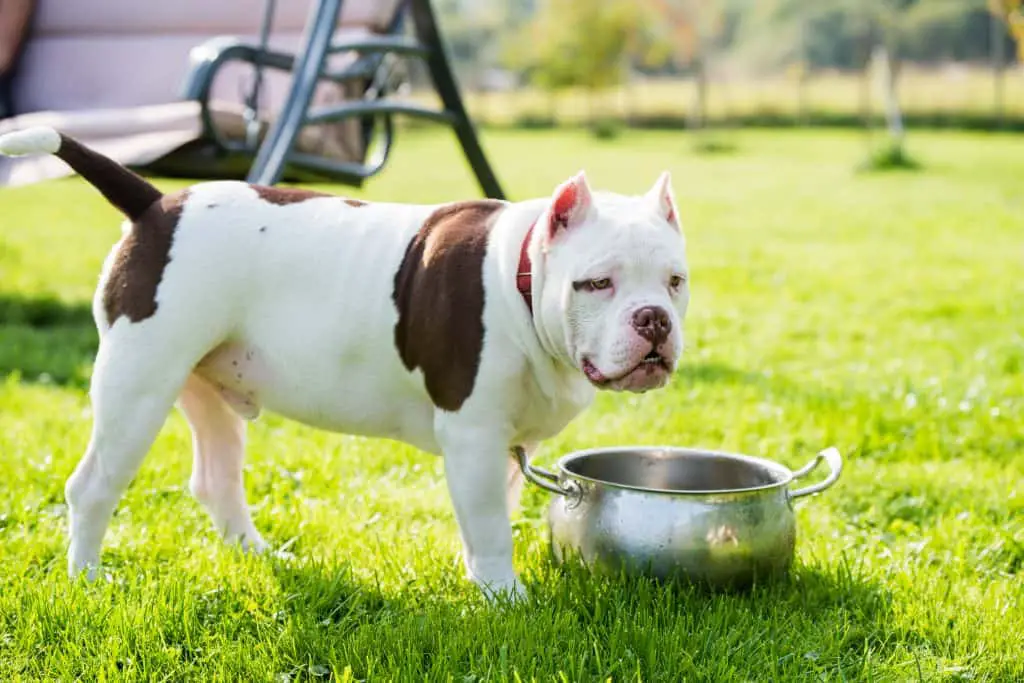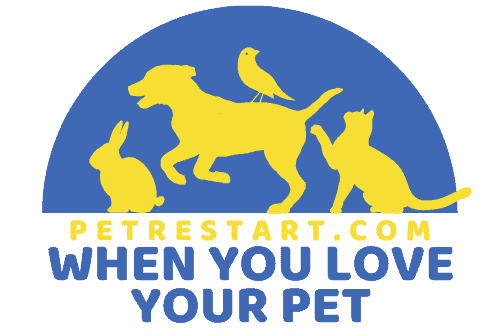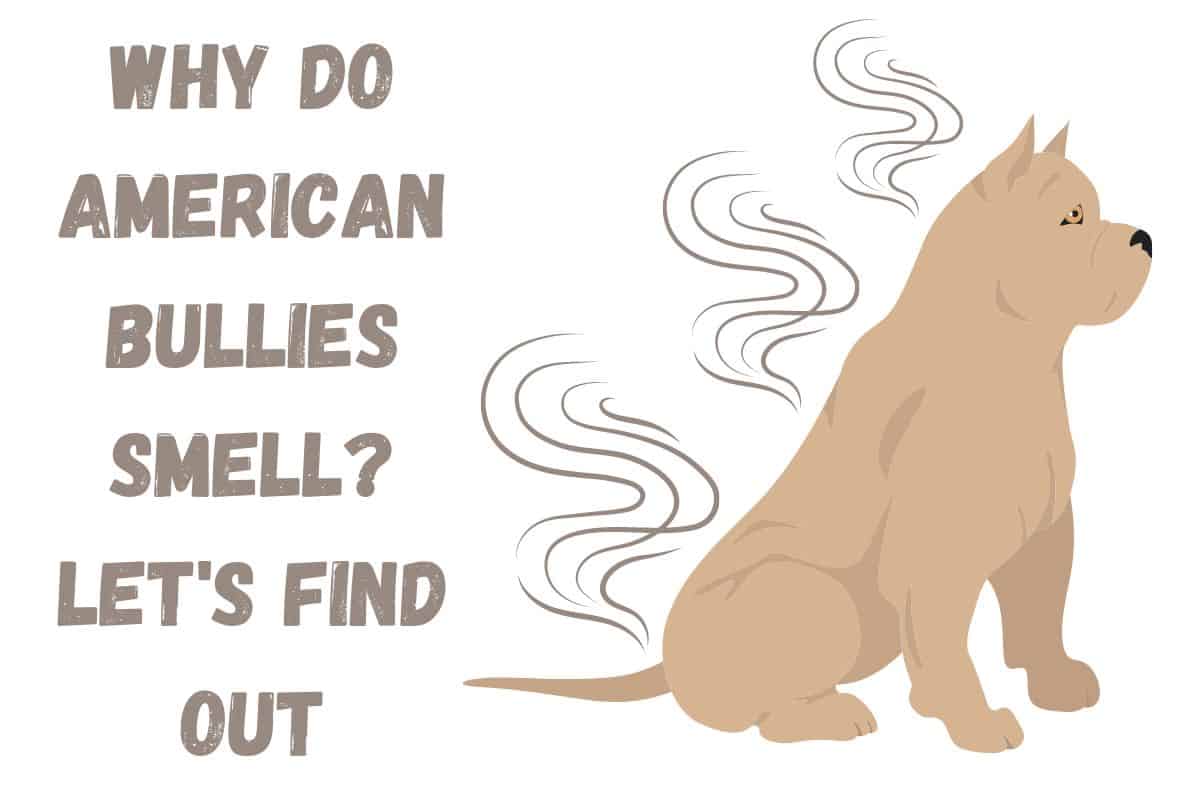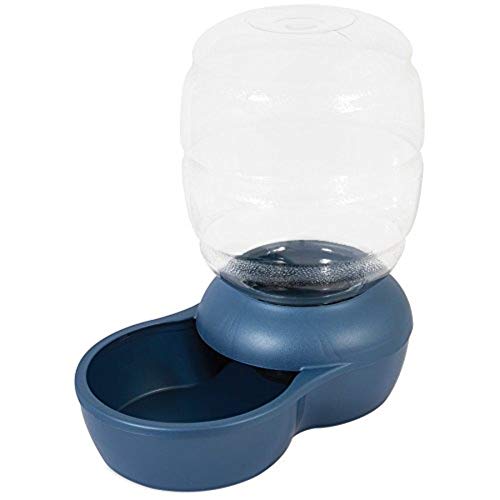The American Bully is one of the most low-maintenance dog breeds. And while they aren’t a particularly stinky breed, this doesn’t mean they’re immune to giving out unpleasant odors. Many factors can lead to an American Bully becoming smelly.
American Bullies can become smelly when their owners neglect their hygiene and grooming. Some health problems can also cause Bullies to smell, such as dental infections, ear infections, skin conditions, and impacted anal glands.
Diagnosing the underlying cause of your Bully’s unpleasant odor is essential to treating and preventing the problem. The rest of this article explores the possible causes of an American Bully’s bad smell and how they can be dealt with. Keep reading to find out more.
Causes of Your American Bully’s Stink
As mentioned earlier, the stink isn’t a problem unique to the American Bully breed. All dogs can become smelly for various reasons such as bad hygiene, health problems, environmental factors, and your dog’s level of activity.

Breeds that are more active and playful will become smelly faster than more sedentary breeds. That’s because they’re more prone to getting dirty when they play, especially outdoors. Also, if your home’s surroundings are dirty, the chances are high that your dog will also get dirty.
In this section, I’ll discuss the different causes of your Bully’s stink and what you can do about it.
Health Conditions
If your dog is bathed regularly and doesn’t get dirty often but has a smell — especially one that it didn’t have before — it’s reasonable to suspect a health problem as the cause of the bad odor. In that case, you may need to consult your veterinarian.
Here are some health problems that may cause your Bullies to smell bad.
Dental Problems
The cause of dental problems in dogs is pretty much the same as in humans. Poor dental hygiene can lead to a build-up of plaque and tartar on your dog’s teeth. Left unchecked, this build-up can also cause gum infections, bone loss, and other serious health complications.
In other words, if your Bully has unusually bad breath, that’s usually a pretty good sign that something is wrong. American Bullies typically have high pain tolerance, meaning they will not show signs of injury or illness until either or both of these are serious enough.
Fortunately, you can prevent dental problems in your Bully via proper oral and dental hygiene. You can brush your dog’s teeth more or less the same way as you do for yourself.
Use a dog toothpaste like the Virbac CET Enzymatic Toothpaste (available on Amazon.com). It’s specially formulated for dogs, and if your Bully is partial to beef or chicken, both of these are available as toothpaste flavors.
Also, it’s important to remember that sweets can damage the enamel of your Bully’s teeth the way they would human teeth. Further, sweets can also cause obesity and diabetes in your dog. Therefore, avoid feeding your Bully sweets (no matter how much they whine to you about it).
Ear Infections
A host of things can cause ear infections in your Bully. Bacteria, fungi, mites, tumors, and polyps can lead to opportunistic infections (i.e. infections that are more likely to happen to those with less-than-healthy immune systems). The most common cause of ear infections in American Bullies is bacteria.
If you notice your dog acting irritable and constantly trying to scratch their ears, an ear infection is a likely culprit. In that case, you must take your Bully to the vet to have them treated with antibiotics and itch-control medications. Once the infection is resolved, the odor should go away.
Skin Infections
Skin infections in dogs can happen for a number of reasons. Flea and tick infestations can lead to constant scratching, which in turn will cause irritation and inflammation of the skin. It may not be immediately evident that the skin is irritated since it’s covered by fur.
That said, a good sign that your Bully is suffering from skin irritation is increased scratching, followed by a foul smell. This is usually caused by exudates that ooze from the inflamed skin. (Exudates are fluids from blood vessels that tend to come out from inflamed or infected areas of the body.)
Again, Bullies have high pain tolerance, so you might not immediately notice that something’s wrong until the infections are pretty bad. If left untreated, the infections could worsen. You’ll then begin to notice patchiness in the coat.
Sarcoptic Mange
Mange is a parasitic skin disease caused by mites. Sarcoptic mites live under the skin and can cause severe itching. The itching, in turn, can lead to open sores. You may also note some crusting, which comes from exudates oozing out of the open sores. Once infected, the sores become smelly.
Demodectic Mange
Like sarcoptic mange, demodectic mange is caused by demodectic mites that live in the hair follicle. The mites can be harmless when the dog is healthy and has a strong immune system. However, once their immunity is weakened, the mite infestation will start to cause symptoms. Like sarcoptic mange, constant itching leads to open sores, infection, and a bad smell.
Skin Allergies
Skin allergies, like skin infections, can also lead to skin irritation and inflammation. The constant scratching will also lead to breaks in the skin barrier that can become infected. Exudates will start to drain from the wounds. Often, these exudates are foul-smelling.
Secondary infections may result from skin irritation. In that case, your Bully will need to receive treatment for the allergies as well as antibiotics. Your vet may also need to run tests to rule out the cause of the allergies.
Once this is done, you’ll need to prevent or minimize exposure to whatever substance your Bully is allergic to. This can either be food or an environmental allergy. If exposure to the allergen cannot be avoided, your vet might prescribe allergy medications.
Skin Fold Pyoderma
Skin fold pyoderma is a kind of skin infection that occurs under the folds of the skin. The infection causes a strong musky odor. While it can occur in any breed, it’s more common in pitbull or Bully breeds that have prominent folds on their skin. This infection usually arises when there’s an overgrowth of the dog’s normal bacteria found naturally on their skin.
Typically, the bacteria don’t cause illness. However, due to the warm, moist environment beneath the skin folds, these bacteria may increase to the point of opportunistic infection. This is when your dog starts to become symptomatic, and soon after this, you’ll begin to notice the pungent odor that accompanies the condition.
Your vet may prescribe a medicated skin cleanser or topical ointment. If left untreated, the condition could worsen and may even require surgery to remove severely infected tissue to prevent systemic infection. (Systemic infection simply means an infection of the bloodstream.)
Impacted Anal Glands
Anal glands or anal sacs are a pair of glands flanking your dog’s anus on each side. They produce a smelly secretion that can either be a thin liquid or a thick paste. The secretions are usually excreted with regular bowel movements. The fecal matter aids in pushing out the contents of these glands, and they come out with the stools.
However, if your Bully doesn’t have regular bowel movements or if they have semi-formed stools or chronic diarrhea, the secretions can build up inside the glands since a formed stool isn’t pushing them out. The glands can then become impacted, and you may observe a foul smell following your dog around.
If you don’t know what to look for, you may not notice the impacted anal glands until they rupture. This will usually present as a gaping wound near your dog’s anus. When an impacted anal gland ruptures, the smell will become even more pungent as the contents of the gland will ooze out.
If the impacted anal gland stays intact and you can’t pinpoint the source of the smell, take your Bully to the vet. This will probably be one of the first things the vet will check for. If your Bully is found to have impacted anal glands, the vet will proceed to milk the glands or extract the secretion build-up. This is a simple procedure that may cause some discomfort.
Your vet might also teach you how to check for impacted anal glands. Some vets teach dog-owners how to milk the anal glands at home. Or they may give you instructions to come back to the clinic once you suspect that the anal glands have become impacted again.
Infected Anal Glands
On top of the anal gland impaction, there may be an infection that may likewise cause the bad odor. When anal glands become impacted, this can sometimes lead to infection if rupture doesn’t occur first. In this case, your vet will extract the secretion build-up as well as prescribe an antibiotic to treat this.
Oral Cancer
When your dog suddenly develops breath that smells like garbage, this is a cause for alarm. It could signal oral cancer and will need immediate medical attention. Like cancers in humans, early diagnosis and treatment is key to overcoming the disease. To diagnose oral cancer, the veterinarian may need to take a tissue sample from your dog.
Gassiness
The bad odor may be due to a bad cause of flatulence. Your Bully may occasionally pass wind, or they can do so in frequent episodes, depending on the extent of gassiness.
Here are some possible causes of gassiness:
- Change In Diet: If you’ve recently switched to another dog food, the new formula may not agree with your Bully’s stomach, leading to gassiness.
- Allergy To Food: Food allergies can also cause the formation of gases, bloating, and gastric upset.
- Consumption of Spoiled Food: Like allergies, spoiled food can cause gas. It may also cause stomach upset and possibly diarrhea.
- Excessive Swallowing Of Air: Dogs can take in a lot of air by panting. Sometimes, this can lead to a gassy abdomen and flatulence.
Hygiene Practices at Home
Hygiene practices at home can make a difference in your Bully’s smell. While American Bullies are generally low maintenance, their hygiene can be neglected by owners with hectic lifestyles.
Here are factors that could affect your Bully’s smell:
- Infrequent Bathing: Unlike cats, dogs aren’t particularly keen on personal hygiene and don’t self-clean the way cats do. Instead, they rely on their owners to bathe them. Luckily, American Bullies are short-haired, which makes their fur relatively low-maintenance. However, the stiff quality of their coat makes it easy for them to trap dirt.
- Poor Quality Shampoo: Poor quality shampoos can also affect the smell of your dog. Some cheap shampoos don’t eliminate odor as effectively as others, making your dog smelly. Sometimes, the shampoo can even be the cause of the smell.
- Environment: The surroundings of the home can also contribute to the smell of your dog. Dirty surfaces around the home or outside the house can seem inviting to your Bully. Keep your dog away from these areas when letting them outside.
- Activity: Your Bully’s activities may also affect their smell. Although dogs don’t sweat through their skin the way humans do, their activities can cause them to stink. Dogs enjoy rolling around on rough surfaces, for example, which makes them dirtier in a shorter time.
How To Bathe an American Bully
The American Bully isn’t hard to bathe, thanks to its short hair.
Here are the steps you can take to give your Bully a thorough bath.
- Bathe your Bully at least once a month. Some owners may want to bathe them more often than that, which is fine. Besides, you may need to bathe your dog more frequently if they’re prone to becoming dirty or smelly.
- Use a non-toxic pet shampoo. These should be available at your local pet stores. Alternatively, you can buy something like the Natural Dog Company Sensitive Skin Shampoo (12 oz) (available on Amazon.com). Even if your Bully has an existing skin condition, this shampoo shouldn’t be too hard on their skin.
- While bathing your Bully, check for fleas and ticks. You may need to use a medicated shampoo to deal with fleas and ticks.
- Be sure to thoroughly rinse off the shampoo. Do not leave any residue. Although most pet shampoos are non-toxic, your dog may accidentally lick the shampoo and ingest it, potentially causing more serious problems than a bad smell.
Other Health and Grooming Tips for the American Bully
Maintaining your Bully’s overall health can prevent many of the conditions that can cause your dog to smell bad.
Here are some health tips that can keep your Bully healthy:
Provide Proper Nutrition
Proper nutrition is essential for the optimum health of your American Bully. A well-nourished Bully is more resilient to disease, which is important as the breed is prone to skin diseases. Mange is an example of how a robust immune system can ward off disease. The mites may be present, but as long as the Bully’s immunity is up, the mites remain dormant.
Ensure Adequate Water Intake
Adequate water intake helps ensure the health of your Bully by preventing dehydration and kidney conditions. Drinking enough water also ensures the proper hydration of the skin. Dry skin is prone to cracking, which breaks the skin integrity and leads to infections that can become a source of your dog’s odor.
The ideal water intake for dogs is approximately 1 ounce of water (1/8 of a cup) per pound (or approx. 0.45 kg) of body weight each day. Some water dispensers for dogs give nearly unlimited water supply for the day, while others pour water into a bowl. Just make sure the water in the bowl is enough to meet the daily water requirement.
I recommend the Petmate Replendish Automatic Gravity Waterer for Cats and Dogs (available on Amazon.com). It’s a fairly low-maintenance water dispenser, as it doesn’t require batteries. Further, it’s BPA-free, so you’re protecting both your dog and the environment.
Give Enough Exercise
An athletic breed like the American Bully needs to be kept active to maintain its muscular build. Adequate exercise helps keep them healthy, helps ensure proper organ function, and bolsters immunity. As I mentioned earlier, a robust immune system can fight off opportunistic skin, gum, and ear infections.
Schedule Regular Vet Appointments
Regular vet appointments ensure that your Bully is constantly assessed for any changes that could signal disease. Since American Bullies have high pain tolerance, the illness usually goes undetected until other signs such as unusual odors, patchiness of the coat, and weakness become evident.
Manage Stress
Managing stress helps keep your American Bully healthy, happy, and stink-free. Stress in a dog can come from the environment, the way your dog is treated at home and your dog’s activity level. For example, show dogs are often put through intensive training that can become stressful for them. Make sure to pace your dog’s training activities, as well as provide adequate nutrition and care.
Final Thoughts
The American Bully isn’t a particularly smelly breed. However, many factors can cause them to smell even after a good bath. A Bully having a foul smell even after a bath isn’t normal and usually signals an underlying disease or a health condition that requires medical attention.
Related Articles
- 4 Best Canned Dog Food for an American Bully
- 4 Best Dog Foods for an American Bully
- What Can I Feed My Bully To Build Muscle? Let’s Find Out!
- American Bully vs. American Bulldog
- American Bully Growth Chart
- Can You Run With an American Bully? Let’s Find Out!
- Why Do American Bullies Smell? Let’s Find Out








